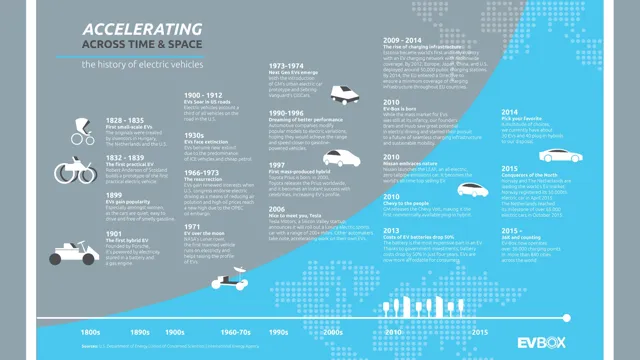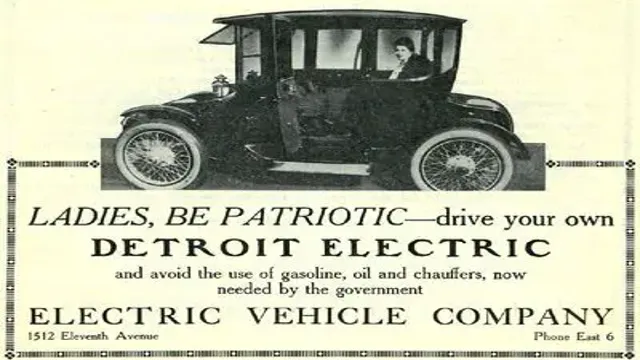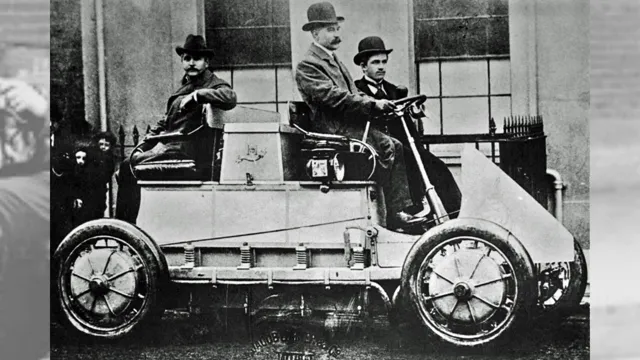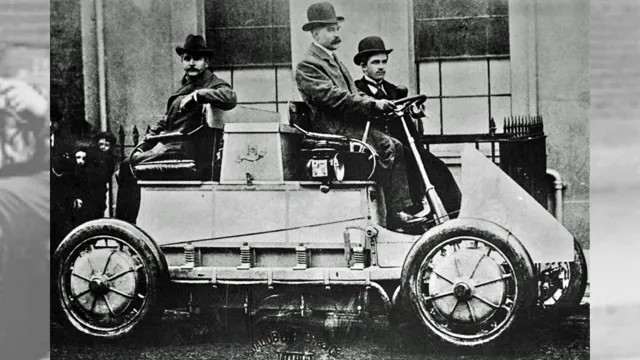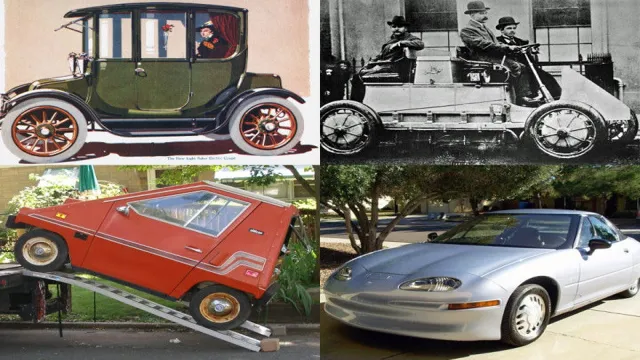The Electrifying Evolution of Electric Cars: A Fascinating Look into the Past, Present, and Future of Sustainable Transportation
Electric cars have been around for a while, but their history and evolution might surprise you. It all started back in the 19th century when inventors began experimenting with battery-powered vehicles. But it wasn’t until the 1970s oil crisis that electric cars began to gain mainstream attention.
Fast forward to today, and electric cars are becoming more popular than ever before, with companies such as Tesla leading the charge. In this blog, we’ll delve into the fascinating history of electric cars, exploring how they’ve evolved over the years and what the future holds for these eco-friendly vehicles. So buckle up and let’s take a trip down memory lane to explore the past, present, and future of electric cars!
Early Electric Cars
Electric cars may seem like a relatively new concept, but did you know that they were actually invented in the early 1800s? At this time, electric vehicles were competing with steam- and gas-powered cars to become the primary mode of transportation. In fact, between 1895 and 1900, electric vehicles were the most popular type of car in the United States. However, advancements in gasoline-powered engines made them more efficient and affordable, causing electric cars to lose popularity.
It wasn’t until the late 20th century that electric cars began to make a comeback, thanks to concerns about environmental pollution and the development of new battery technologies. Nowadays, electric cars are becoming more mainstream and are poised to become the norm in the not-too-distant future. With their environmental benefits and rapid technological advancements, it’s an exciting time to be part of the history about electric cars.
1800s – Introduction of Electric Cars
In the 1800s, the introduction of electric cars marked a significant shift in transportation technology. The early electric cars were slow and impractical since they relied on large, heavy batteries that took hours to charge. However, these cars were seen as an alternative to the gasoline-powered vehicles that were becoming increasingly popular at the time.
The first electric car was designed and built in the 1830s by Robert Anderson, a Scottish inventor. Later on, many other inventors, including Thomas Davenport and Thomas Parker, improved upon the original design and created more efficient electric motors. Despite this, electric cars did not gain widespread popularity until the early 1900s, when they were favored by women drivers due to their ease of use and quietness.
In the present day, electric cars are once again experiencing a surge in popularity as concerns over the environment grow and technology improves.
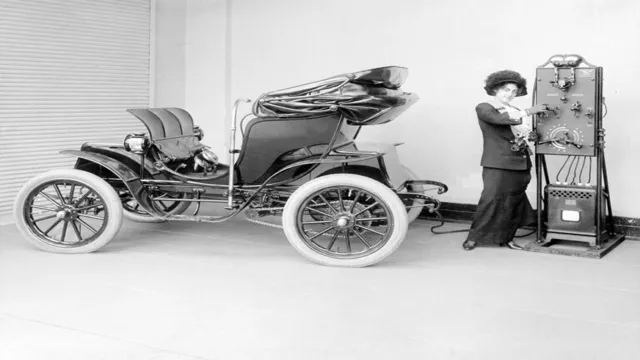
1900s – Rise and Fall of Electric Cars
In the early 1900s, electric cars started to gain popularity as an alternative to the combustion engine. These early electric cars were quiet, easy to operate, and emitted no pollutants, making them an appealing option for urban dwellers. One of the first electric cars was created in 1884 by Thomas Parker, a British inventor.
However, it wasn’t until the early 1900s that electric cars gained traction in the United States. By 1912, electric cars made up a third of all vehicles on the road in the U.S.
Major automakers such as Ford and General Motors even had electric car models in their lineup. However, the high cost of batteries and limited driving range proved to be significant challenges for electric cars, and as the price of gasoline dropped, the popularity of electric cars declined. By the 1930s, most automakers had stopped producing electric cars, and the combustion engine became the standard in the auto industry.
Nevertheless, the early electric cars paved the way for future advancements in electric vehicle technology.
Modern Day Electric Cars
The history of electric cars date back to the 19th century when inventors first began exploring the potential of electric-powered transportation. However, it wasn’t until the 21st century that electric cars truly began to come into their own. The modern-day electric car has revolutionized the automotive industry, offering drivers a clean, sustainable, and efficient alternative to traditional gasoline engines.
With advances in technology, electric cars are now able to travel longer distances on a single charge, making them a practical option for everyday use. Additionally, their low maintenance needs and reduced carbon footprint make them an attractive option for environmentally-conscious consumers. Overall, the history of electric cars is one of persistence, innovation, and a commitment to creating a greener, more sustainable future.
1990s – Introduction of Hybrid Cars
In the 1990s, a new type of car began to make its debut – the hybrid car. These vehicles used a combination of gasoline and electric power to increase fuel efficiency and reduce emissions. Today, we have progressed even further with modern day electric cars like the Tesla Model S and Nissan Leaf.
These cars run solely on electricity and offer a variety of benefits such as zero emissions, lower fuel costs, and a smooth, quiet ride. While electric cars are still a relatively new technology, advancements in battery technology and charging infrastructure are making them more accessible and convenient for everyday drivers. Plus, with companies like Tesla pushing the boundaries of what is possible in electric vehicle technology, the future looks bright for a world powered by sustainable transportation.
2000s – Popularization of Electric Cars
Electric Cars The 2000s were the turning point for electric cars, as the world began to shift towards sustainability and clean energy. Modern electric cars are a far cry from their early prototypes, offering more efficient batteries, longer ranges, and sleeker designs. Companies like Tesla, Nissan, and Chevrolet have become leaders in the industry, offering models that can run for hundreds of miles on a single charge, with impressive acceleration and top speeds to match.
Not only are these cars better for the environment, but they also save drivers money on gas and maintenance costs, making them a more practical choice for everyday use. And with advancements in charging infrastructure and battery technology, owning an electric car has never been easier or more convenient. Whether you’re a city dweller or a long-haul commuter, there’s an electric car out there for you.
So why not make the switch and join the electric revolution?
2010s – Improvements in Battery Technology
With advancements in battery technology over the last decade, we’ve seen a new era of electric cars come into existence. Thanks to improved battery life and charge times, modern-day electric cars are more practical and convenient than ever before. No longer do you have to worry about running out of power mid-journey – most electric cars on the market today can travel well over 200 miles on a single charge.
Recharging is also quicker and more efficient than before, with many models capable of charging up to 80% in as little as thirty minutes. Not only are these cars more practical and convenient for everyday use, but they’re also helping to reduce our dependence on fossil fuels, making them an eco-friendly alternative. It’s exciting to see how far we’ve come in battery technology and where we’ll go next in the quest for even better electric cars.
Advantages of Electric Cars
Electric Cars have become increasingly popular over the years due to their numerous benefits for both the environment and the consumers. Despite their recent rise to fame, the history of electric cars dates back to the early 1800s. The first electric car was invented by Scottish inventor Robert Anderson in 1832, and throughout the 20th century, several notable car manufacturers such as General Motors, Ford, and Toyota, experimented with electric models.
However, electric cars were not widely adopted by consumers until the mid-2000s, due to advancements in battery technology, government incentives, and increased concern for the environment. Today, electric cars are becoming more and more ubiquitous and are proving to be an excellent alternative to traditional gasoline-fueled cars since they produce no emissions, provide a quieter ride, and require less maintenance. With their advanced technology, electric cars are paving the way for a greener future, and their benefits are undoubtedly worth considering.
Emissions Reduction
One of the biggest advantages of electric cars is their potential to reduce emissions and their contribution to global warming. Electric cars produce zero emissions and use renewable energy sources, which makes them a much more eco-friendly alternative to traditional petrol and diesel cars. This is particularly important in light of climate change, which is caused in part by the burning of fossil fuels.
By switching to electric cars, we can significantly reduce our carbon footprint and help to mitigate the harmful effects of climate change. Moreover, electric cars are incredibly energy-efficient, which means they are cheaper to run than traditional cars. Overall, the advantages of electric cars for emissions reduction are clear, and we can all play a role in creating a cleaner, more sustainable future by investing in electric vehicles.
Lower Fuel Costs
Lower Fuel Costs One of the biggest advantages of owning an electric car is the significant savings on fuel costs. Unlike traditional gas-powered cars, electric vehicles (EVs) run on electricity, which is much cheaper than gasoline. In fact, many studies show that EVs can save drivers up to 50% on fuel costs compared to traditional vehicles.
This is not only great for your wallet, but also for the environment, as electric cars produce zero emissions. Additionally, with advancements in charging technology, it is becoming increasingly convenient to charge your car on-the-go. You can charge your EV at home, work, or at one of the many public charging stations around the country.
With lower fuel costs and more charging options becoming available, there has never been a better time to consider making the switch to an electric car.
Future of Electric Cars
Electric cars have come a long way since their first inception in the late 1800s. The first electric cars were actually some of the most popular vehicles on the road, with many competing brands like Baker, Rauch & Lang, and Detroit Electric. However, with the advent of the Ford Model T and the mass production of gasoline-powered vehicles, electric cars fell out of favor and essentially became niche vehicles for specific purposes, like golf carts and forklifts.
It wasn’t until the late 1990s and early 2000s that electric cars began to make a comeback, with the introduction of the Toyota Prius hybrid in 1997 and the Tesla Roadster in 200 Today, the future of electric cars is looking brighter than ever, with more and more manufacturers offering electric or hybrid options, as well as advancements in battery technology and charging infrastructure. Though the road to widespread adoption of electric cars has been a somewhat bumpy one, it seems clear that the trend is definitely moving in that direction, as governments around the world are pushing for cleaner, more sustainable transportation options.
Conclusion
The history of electric cars is an electrifying tale of innovation and perseverance. From the early days of battery-powered vehicles struggling to keep up with the speed and convenience of their fossil-fueled counterparts, to the modern era of sleek, high-tech electric cars dominating the market, it’s clear that the electric car has come a long way. And while it may have taken some time for the world to fully embrace this environmentally-friendly and efficient mode of transportation, it’s safe to say that the future of electric cars is bright.
So, let’s all plug in and join the electric revolution!”
FAQs
What is the history of electric cars?
Electric cars were first invented in the 1830s, but they did not gain popularity until the late 1990s.
When did electric cars become commercially available?
Electric cars became commercially available in the late 1990s, with the Toyota Prius and the General Motors EV1 being among the first models.
How has the technology of electric cars evolved over time?
The technology of electric cars has evolved significantly over the years, with advancements in battery technology, charging infrastructure, and overall range.
What are the environmental benefits of electric cars?
Electric cars produce zero emissions, which helps to reduce air pollution and greenhouse gas emissions. They also have the potential to be charged with renewable energy sources, such as solar or wind power, making them even more environmentally friendly.
